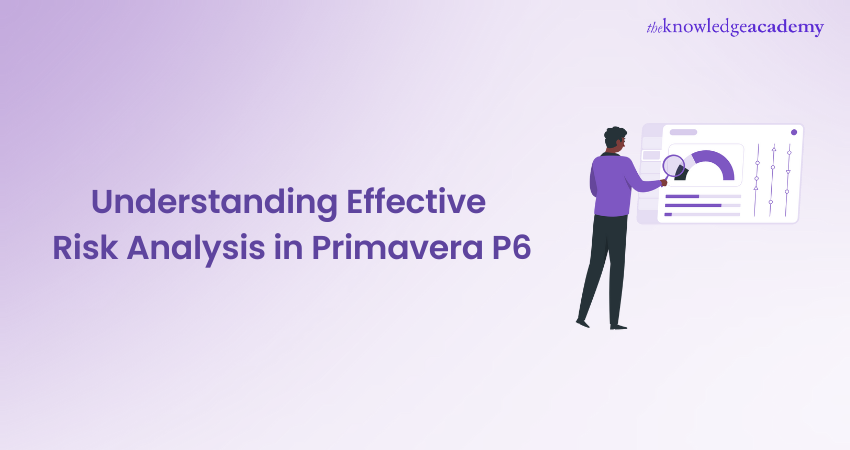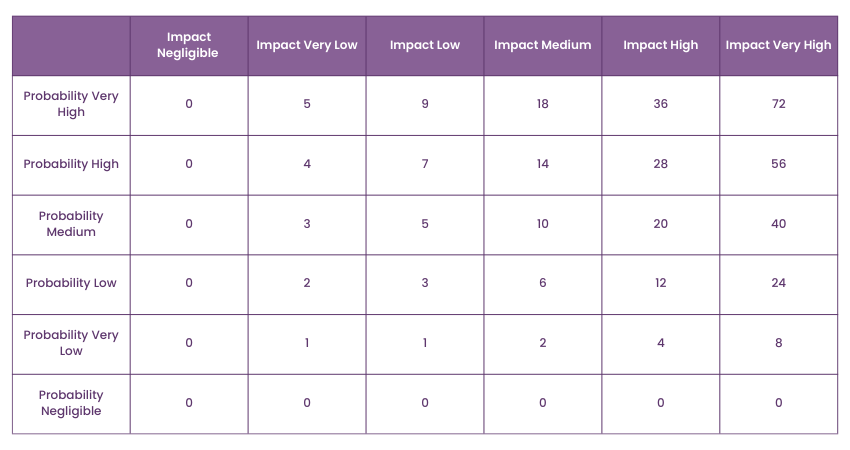We may not have the course you’re looking for. If you enquire or give us a call on + 1-866 272 8822 and speak to our training experts, we may still be able to help with your training requirements.
Training Outcomes Within Your Budget!
We ensure quality, budget-alignment, and timely delivery by our expert instructors.

Assessing risks and mitigating them is an essential part of Project Management. This practice not only exists on a manual and inter-social level in business but also extends to Project Management software. An example of this is Risk Analysis in Primavera P6, allowing you to keep track of all potential risks and document them with great efficiency.
According to Statista, Project Management software increased on-time project completion frequency across 65% of the teams surveyed. Software like Primavera and its Risk Assessment features play a great part in this. Keep reading this blog to learn Risk Analysis in Primavera P6 and how to effectively perform a Risk Assessment with Primavera to minimise uncertainty and ensure project success.
Table of content
1) What is Risk Analysis?
2) Risk Analysis in Primavera P6
3) Risk Management in Primavera P6
4) Primavera Risk Analysis features
5) Conclusion
What is Risk Analysis?
Before you learn about Risk Analysis, you need to know what the term “risk” denotes in a project or a business environment. Risk in Primavera P6 refers to any entity, situation or factor that can divert the project from reaching its desired goal. Risks can slow down the progress of a project, lead to errors and cease the Project’s progress entirely.
The term “Risk Analysis” simultaneously refers to detecting and gauging uncertainties, and the Primavera tool allows a Project Manager to perform these tasks. The Primavera Risk Analysis tool, known as the “Pertmaster” in the past, is frequently used by Primavera users and works with Primavera P6, Primavera P3, and even Microsoft Project. To avoid confusion between the Risk Analysis process and the tool, the Primavera tool will be referred to as the “Risk Analysis tool’.
Risk Analysis in Primavera P6
Assessing risk in Primavera with the Primavera Risk Analysis (PRA) tool has certain steps and order. Primavera P6 assesses all events and conditions that can lead to future project failure or disrupt the project completion process. This is done with the help of Risk Score generation in Primavera software. Due to the inbuild Risk Management features of Primavera, you can identify, categorise and prioritise these risks.
Primavera P6 allows you to determine factors such as financial impact, range of the impact and potential profit in the project. This is achieved by filling in all the necessary details within the Risk Details segment of the “general” tab and selecting “impact”. If your organisation gives you editing privileges within the Primavera software, you can proceed with steps to analyse risks.
Assigning a Risk
Start by opening the Risk detail page within Primavera P6. Now, you can assign the fitting risk to the activities within the activity tab on this page. You can apply risks to multiple activities by clicking and holding the ctrl key. The risks can also be assigned through the activity detail page by clicking the “assign” option in the “risks” tab.
Determining Risk Score
A risk score is calculated in Primavera P6 based on the values entered by you while assigning a risk. The risk score impact values can range from negligible to very high in Primavera, determining its severity. This varying risk score allows you to choose how to respond to risks. By selecting a response, you can add the necessary description detailing how the issue must be tackled.
The table below demonstrates how Primavera assigns risk score value based on the detected Score. It has two parameters based on the probability of risk and the impact of the risk.

Risk Response
To view your response to risk in Primavera P6, click the "impact" tab and click the "response" section. Here, you can assign a description and proper values to each risk and change factors, such as cost, probability, and schedule. Primavera aids this process with its pre- and post-response tabs, giving you different parameters to work with.
Gain familiarity with the P6 dashboard with our Primavera P6 Dashboards and Reporting course!
Risk Management in Primavera P6
Once you have assessed the possible risks in your project, you can switch to taking steps to fix them. Taking necessary actions and initiative to fix and counter possible risks is called Risk Management in Primavera. You can start risk management by accessing the documented risks to your project. In Primavera, you can find the ‘risk tab’ in ‘activities detail’, allowing you to proceed further.
Once you click the ‘risks’ icon, you can go to the detail tabs and add the necessary details. You can then move to the general tab and identify the risk category, the person involved with the risk, the type of risk etc. Once the risk is selected, you can head to the "activities" tab to assess how many activities are affected by the selected risk.
You can add further details on the risk, such as the cause of the risk, by using the ‘cause time’ on Primavera. You can then move on to the next tab in the risks section, clicking "effect" to document the effects of the said risk. Lastly, you can add a necessary note with the assigned risk and activity to help your team take care of risk more efficiently.
Primavera Risk Analysis Features
Primavera Risk Analysis has certain features that aid your Risk Assessment and Management process. Some such valuable features of the PRA tool that can aid you in project Risk Assessment are as follows:
Risk Models
Primavera Risk Analysis allows you to use different risk models such as task existence, fixed cost uncertainty, estimate uncertainty, variable cost uncertainty etc. PRA tool achieves this with the help of Monte Carlo-based cost and schedule analysis.
Risk Register
The risk Register feature in Primavera allows you to produce positive and negative risk event-based models. These qualitative and quantitative models allow you and your team to develop more effective risk mitigation strategies.
Risk Register Wizard
Primavera's Risk Register Wizard feature allows you to define score criteria, map risk to activities, and enter quality-based risks. This feature allows you to create risk registers, which aid you in Risk Assessment.
Quick Risk
Primavera has a quick risk template feature that uses Work Breakdown Structure (WBS) to assign uncertainties to activities. Additionally, this feature had activity code, filters, and user-defined parameters resulting in more efficient quick risk execution.
Schedule Check
The Schedule Check feature in Primavera allows you to check common scheduling problems and determine risk readiness and schedule maturity. This feature gives you an explanation of how a rationale can affect a list of activities.
Deliver projects with greater efficiency! Master Primavera with our Primavera Training!
Conclusion
After reading this Primavera P6 Risk Analysis blog, we hope you now have a better understanding of Risk Analysis in Primavera P6. This blog covered the details of PRA software and how to assess risk efficiently in Primavera. Thank you for reading.
Learn the details of EPS and OPS elements with Primavera P6 Application Administration!
Frequently Asked Questions

Risk analysis is crucial in Project Management because it helps identify potential issues that could impact project success. By assessing and managing risks, Project Managers can mitigate threats, allocate resources effectively, and ensure projects stay on track, ultimately enhancing the likelihood of achieving project goals.

Common Risk Analysis techniques used in Primavera P6 include Monte Carlo simulations, sensitivity analysis, and risk registers. These techniques help Project Managers identify, assess, and mitigate risks. Earning a Primavera Certification can enhance your ability to effectively use these tools and improve project outcomes.

The Knowledge Academy takes global learning to new heights, offering over 30,000 online courses across 490+ locations in 220 countries. This expansive reach ensures accessibility and convenience for learners worldwide.
Alongside our diverse Online Course Catalogue, encompassing 17 major categories, we go the extra mile by providing a plethora of free educational Online Resources like News updates, Blogs, videos, webinars, and interview questions. Tailoring learning experiences further, professionals can maximise value with customisable Course Bundles of TKA.

The Knowledge Academy’s Knowledge Pass, a prepaid voucher, adds another layer of flexibility, allowing course bookings over a 12-month period. Join us on a journey where education knows no bounds.

The Knowledge Academy offers various Primavera Training including Contract Management Training, Business Contract Law etc. These courses cater to different skill levels, providing comprehensive insights into Benefits of Primavera P6.
Our Office Applications Blogs cover a range of topics related to Primavera, offering valuable resources, best practices, and industry insights. Whether you are a beginner or looking to advance your Project Management expertise, The Knowledge Academy's diverse courses and informative blogs have you covered.
Upcoming Office Applications Resources Batches & Dates
Date
 Primavera P6 Professional Fundamentals
Primavera P6 Professional Fundamentals
Mon 6th Jan 2025
Mon 17th Mar 2025
Mon 26th May 2025
Mon 14th Jul 2025
Mon 22nd Sep 2025
Mon 24th Nov 2025
Mon 8th Dec 2025







 Top Rated Course
Top Rated Course



 If you wish to make any changes to your course, please
If you wish to make any changes to your course, please


